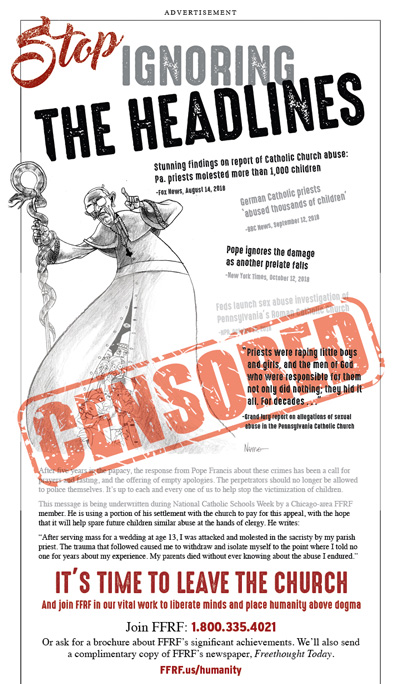Mobile Menu

Lauryn Seering
Freethought Radio -- February 14, 2019
FFRF seeks to sustain free speech victory against Abbott
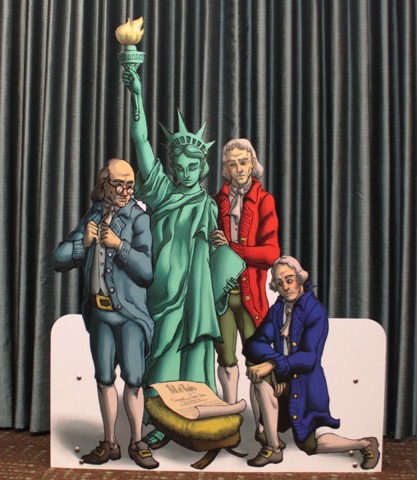 A historic triumph for free speech — especially for nonbelievers — in the Lone Star State is being defended in appeals court.
A historic triumph for free speech — especially for nonbelievers — in the Lone Star State is being defended in appeals court.
The Freedom From Religion Foundation has filed its brief in the 5th U.S. Circuit Court of Appeals to sustain its win last year in federal court against Texas Gov. Greg Abbott’s removal of its winter solstice Bill of Rights “Nativity” from the state Capitol in 2015.
FFRF, a national state/church watchdog with more than 31,000 nonreligious members, including over 1,300 in Texas, had placed a duly permitted display celebrating the winter solstice and Bill of Rights Day in December 2015 in response to a Christian nativity at the Texas Capitol. The whimsical display, depicting Founding Fathers and the Statue of Liberty celebrating the “birth” of the Bill of Rights (adopted Dec. 15, 1791), had the requisite sponsorship from a Texas legislator. Abbott, as chair of the Texas State Preservation Board, ordered FFRF’s display taken down only three days after it was erected, lambasting it as indecent, mocking and contributing to public immorality.
In a final judgement issued last June, U.S. District Judge Sam Sparks, for the Western District of Texas - Austin Division, declared that Abbott had violated FFRF's free speech rights. (FFRF had received an initial ruling in its favor in October 2017.)
“Defendants violated FFRF's First Amendment rights and engaged in viewpoint discrimination as a matter of law when the FFRF exhibit was removed from the Texas Capitol building under the circumstances of this case,” Sparks ruled.
On appeal to the 5th Circuit, Abbott did not contest the district court’s ruling that he violated FFRF’s free speech rights, explains FFRF Associate Counsel Sam Grover, so there are only a few remaining contested issues.
The first is whether the court should also issue an injunction against the censorship of FFRF’s display in the future. A second issue on appeal, raised by FFRF, is whether the 5th Circuit should reverse the lower court’s rejection of FFRF’s challenge to the State Preservation Board’s standards of review for display applications. FFRF argues that the requirement that displays have a “public purpose” grants government officials unbridled discretion to reject applications for impermissible purposes, such as Abbott’s hostility toward FFRF’s message. The district court ruled that Abbott’s order was illegal, but FFRF is asking the 5th Circuit to ensure that the State Preservation Board cannot abuse the public purpose requirement in the future — by doing away with the requirement in its entirety.
“This case is about censorship and exclusion of viewpoints from a public forum based on the personal disapproval of individual government officials, i.e., the appellants, Gov. Greg Abbott and the executive director of the Texas State Preservation Board,” states the brief’s introduction. “Acting with autocratic impunity, Gov. Abbott ordered the Freedom From Religion Foundation’s display of a Bill of Rights and Winter Solstice Exhibit immediately removed from the Texas State Capitol, despite preapproval by the State Preservation Board.”
Abbott and the State Preservation Board now have 30 days to file their response to FFRF’s brief, followed by a reply from FFRF before the case is scheduled for oral argument.
“We’re confident that we will prevail yet again in our defense of a fundamental American liberty,” says FFRF Co-President Annie Laurie Gaylor. “Abbott cannot be allowed to ride roughshod over the rights of so many Texans.”
FFRF is represented by Attorney Richard L. Bolton with FFRF Associate Counsel Sam Grover and Senior Counsel Patrick Elliott as co-counsel. More history about the case (Case No. 18-50610) can be found here.
Take action to ensure public schools teach facts, not superstition
State legislatures across the country are introducing bills to permit, and in some cases require, school districts to include bible “literacy” classes in their curriculum.
In theory, a public school bible course may be permissible, but it must be taught in a manner that complies with applicable federal and state law. All too often, the youngest students are targeted, only one religion’s “holy book” is selected, and there are no readings outside the bible or other religious materials. Courts routinely rule that these courses are unconstitutional because, in practice, courses preach the bible as religious truth, rather than teaching it objectively. FFRF successfully sued Mercer County, West Virginia, over its bible classes beginning in the first grade, which had been taught for more than 75 years. One lesson promoted creationism by claiming humans and dinosaurs co-existed and asking students to “picture Adam being able to crawl up on the back of a dinosaur! He and Eve could have their own personal water slide! Wouldn’t that be so wild!” Our lawsuit stopped those classes last year.
In Rhea County, Tennessee, for decades bible students from William Jennings Bryan Bible College, whose motto is “Christ Above All,” conducted weekly classes known as Bible Education Ministry, targeting the youngest public school students. The court, in ruling in FFRF’s favor against such religious instruction, said, “This is not a close case. Since 1948, it has been very clear that the First Amendment does not permit the State to use its public school system to ‘aid any or all religious faiths or sects in the dissemination of their doctrines.’” (1) In a Mississippi case, the court found that “A Biblical History of the Middle East” class violated the Establishment Clause (2), noting that it was significant that the bible was the only text used in the course and that the tests were given based solely on the bible text.
These classes are challenged so often because they rarely comply with the law. In 2007, Texas passed a law mandating bible classes. In 2013, Dr. Mark A. Chancey, a professor of religious studies at Southern Methodist University (3), conducted a study of these classes and found that many bible courses in Texas schools “are blatantly and thoroughly sectarian, presenting religious views as fact and implicitly or explicitly encourage students to adopt those views.” (4) The study surveyed 57 public school districts with bible courses and found that course materials were of low academic quality, and that “many of [these materials] are written specifically for Christian audiences for the purpose of strengthening their faith.” (5) This one-sided teaching is an endorsement of religion in violation of the First Amendment.
It is very difficult to teach the bible objectively and critically, as the First Amendment would require. For instance, would Christian parents want their public schools teaching that the idea that Jesus was born of a virgin is based on a simple mistranslation? The Hebrew word almah, meaning “young girl,” not virgin, was mistranslated into Greek as parthenos, “virgin,” even though there is a different Hebrew word for virgin.
We urge you to encourage your elected officials to refrain from subjecting students to classes that are likely to violate their First Amendment right and to expose school districts to serious legal and financial liability. Public schools exist to educate, not to indoctrinate. The difficulty of preventing teachers from imposing their personal religious agendas and of ensuring objectivity inevitably leads to litigation whose expenses can be disastrous for public schools. Religion in schools is innately divisive; its presence builds walls between children, which invariably leads to bullying and persecution, as is well documented in the court cases cited.
(1) Doe v. Porter, 188 F.Supp.2d 904, 914 (E.D. Tenn. 2002), aff’d, 370 F.3d 55
8 (6th Cir. 2004) (quoting Illinois ex rel. McCollum v. Bd. of Educ., 333 U.S. 203, 211 (1948)).
(2) Herdahl v. Pontotoc Cty. Sch. Dist., 933 F.Supp. 582 (N.D. Miss. 1996).
(3) Dr. Chancey has a Ph.D. from Duke in the New Testament and Early Judaism. He is the author of The Myth of a Gentile Galilee (2002) and Greco-Roman Culture and the Galilee of Jesus (2005), and the coauthor of Alexander to Constantine: Archaeology of the Land of the Bible with Yale University Press (2012). His reports have been published in the journals Religion & Education, Journal of Church and State, Religion and American Culture, and Journal of the American Academy of Religion. Chancey now serves as a member of the editorial boards of Religion & Education and Teaching the Bible.
(4) Mark A. Chancey, Texas Freedom Network, Reading, Writing & Religion II: Texas Public School Bible Courses in 2011-12 viii-ix (2013), http://www.tfn.org/site/DocServer/TFNEF_ReadingWritingReligionII.pdf?docID=3481.
(5) Id. at 13.
FFRF co-sponsors freethinking women of color’s unique October gathering
Black History Month is a fitting time to call attention to a unique upcoming conference that the Freedom From Religion Foundation is proudly co-sponsoring.
The Women of Color Beyond Belief Conference, scheduled for Oct. 4-6 at the Marriott Midway Hotel in Chicago, will be the first national secular forum exclusively focused on the perspectives of women of color who are atheists, agnostics, humanists, freethinkers and skeptics. It will highlight the work of women of color within the secular community and provide a multiracial, feminist vision of leadership and activism in secularism. The panels, presentations, workshops and performances will touch on a range of issues, including church-state separation activism, religion in marginalized communities, violence against women, and feminism, anti-racism and racial justice action.
Black Nonbelievers, the Black Skeptics Group and the Women's Leadership Project are partnering to put together the event.
“The conference aims to create more inclusive opportunities in secular organizing, policy and practice,” say conference organizers Mandisa Thomas, Sikivu Hutchinson and Bria Crutchfield. “Over the past decade, women of color secularists have challenged mainstream secular leadership, pushing for social, racial, and gender justice against the evangelical, conservative right-wing tide. We hope this conference empowers more secular women of color to speak up, understand that there are more of us out here, and become motivated to get involved.”
The Freedom From Religion Foundation, the largest event co-sponsor, is joined by Secular Woman and the American Humanist Association. FFRF is delighted at the role it is playing.
“It gives us special joy to spotlight the concerns of freethinking women of color,” says FFRF Co-President Annie Laurie Gaylor. “We’re confident that the conference will be a resounding success.”
Scholarship support is available and child care will be provided by Camp Quest. The conference invites everyone to attend, as a prime objective is for women of color to be heard by the rest of the secular community.
Black Nonbelievers is a nonprofit fellowship headquartered in the Atlanta area that is dedicated to providing an informative, caring, festive and friendly community. Black Skeptics Group is a community-based organization that provides social justice resources, educational initiatives and scholarships for nonbelievers, humanists and secularists of color. The Women's Leadership Project is a black feminist mentoring, civic engagement and advocacy program for girls of color based in South Los Angeles, focusing on sexual harassment and sexual violence prevention education, women of color social history, reproductive justice, LGBTQI youth rights and college readiness.
The Freedom From Religion Foundation is a national educational nonprofit with more than 31,000 members and several chapters around the country. Its purposes are to uphold the constitutional separation between church and state, and to educate the public on matters related to nontheism.
Freethought Radio -- February 7, 2019
FFRF ready to defend yet again ban on church electioneering
The law that prevents religious institutions from openly cheerleading political candidates is yet again under attack — and the nation’s leading state/church watchdog plans to once more make sure that this assault is thwarted.
The Johnson Amendment keeps all 501(c)(3) nonprofits nonpartisan. Under it, churches and tax-exempt 501(c)(3) nonprofits may not endorse or oppose specific political candidates.
Several leading GOP lawmakers, such as House Republican Whip Steve Scalise, R-La., and Sen. James Lankford, R-Okla., recently reintroduced the misnamed “Free Speech Fairness Act,” which is designed to revoke the Johnson Amendment.
“We need to repeal the Johnson Amendment so people of faith can freely express their views without fear of retribution by the IRS or any other Washington bureaucrat,” said Scalise. “For the past 65 years, the Johnson Amendment has unjustly barred religious leaders and other employees of 501(c)3 organizations from fully exercising their freedom of speech.”
Lankford made similarly deceptive claims.
“The federal government and the IRS should never have the ability to inhibit free speech,” he said. “The Free Speech Fairness Act is needed to prevent government intrusion and suppression of free speech by removing a restriction on speech that has existed since 1954. The First Amendment right of free speech and right to practice any faith, or no faith, are foundational American values that must extend to everyone, whether they are a pastor, social worker, or any charity employee or volunteer.”
But Scalise and Lankford have it all wrong. The Johnson Amendment doesn't prohibit free speech. Pastors and clergy are free to personally endorse and support candidates, and often do. Under the Johnson Amendment, they can also sermonize or comment on moral issues (war, abortion/contraception access, civil rights, poverty, etc.) and can even advise their parishioners on how to vote on referenda items. They can comment on the job performance of public officials. They can engage in nonpartisan “get out the vote” campaigns. However, religious and other 501(c)(3) nonprofits can’t use their tax-exempt donations and resources for partisan politicking, including endorsing candidates.
If the Johnson Amendment were repealed as it applies to religious institutions, they could essentially become unregulated PACs. Since churches are uniquely exempt from filing returns with the IRS, they are financial black holes, potentially inviting all manner of dark money if the ban on politicking is lifted.
Scalise and Lankford lack public support for their proposal. The Johnson Amendment is enormously popular with the American people. Four out of five Americans oppose politicking from the pulpit, according to a 2016 survey by LifeWay Research, the Southern Baptist Convention's research arm. Fully 79 percent oppose pastors endorsing candidates during a church service. More than eight in 10 believe it's inappropriate for churches to use their resources for political campaigns.
Precisely because the Freedom From Religion Foundation is on the right side of public opinion, it has been able to previously beat back assaults on the Johnson Amendment. Just last year, for instance, FFRF successfully mobilized its 30,000 members nationwide. Members inundated their legislators with one message: Protect the Johnson Amendment.
The state-church watchdog voluntarily dismissed a lawsuit in December 2017 — which can be refiled at any time — against President Trump over his church politicking executive order after forcing the Department of Justice to admit in court that a presidential executive order cannot overturn congressional laws, including the Johnson Amendment. FFRF previously sued the IRS in 2012 for not enforcing the Johnson Amendment, indeed not even having an official in place to determine if churches were violating the important safeguard. The lawsuit changed that.
The danger to the Johnson Amendment is not over, but FFRF is ready to defend it with all its might. The secular foundation of this country is too important to be left unguarded.
Prayer breakfast bipartisan insult to Constitution, FFRF contends
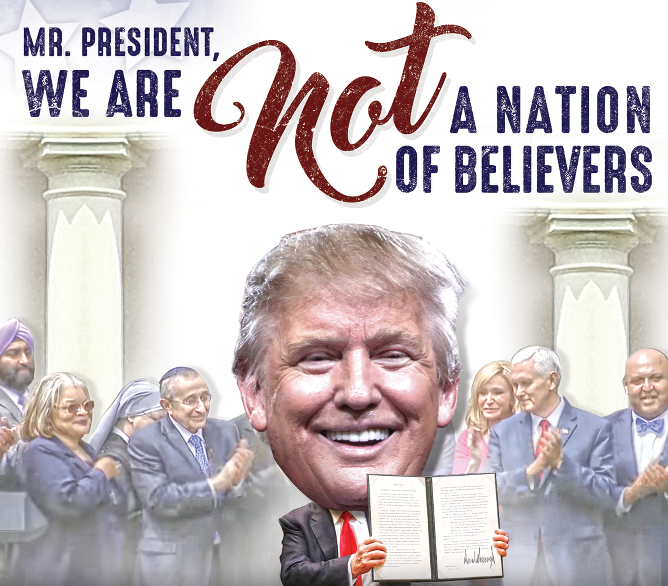
Top GOP and Democratic officials — led by President Trump — will be jointly insulting our secular Constitution this week. On Thursday, Feb. 7, thousands of political bigwigs will participate in a “National Prayer Breakfast” in Washington, D.C.
“The National Prayer Breakfast is an annual gathering in Washington, D.C., that draws 3,500 people from all over the world,” boasts the organizers’ website. “During this event, the President of the United States, representatives from more than 120 nations, leaders from all areas of the United States government, and individuals from various walks of life come together.”
Although the breakfast is technically sponsored by the private Fellowship Foundation, which is dedicated to “the teachings and precepts of Jesus,” the name itself and the blurring of lines between the public and the private makes it seem like a governmental affair. “The U.S. Congress hosts the National Prayer Breakfast, and the Christian organization, The Fellowship Foundation, organizes the event on their behalf,” a website revealed for the 2017 event.
A further indication of the bipartisan blessing showered on the gala is how many prominent Democrats are involved, too. Sen. Chris Coons, D-Del., is a main organizer.
“One of Coons’ closest spiritual confidants is Sen. James Lankford, R-Okla., with whom he co-chairs both the weekly Senate Prayer Breakfast and the annual National Prayer Breakfast,” says a Religion News Service article.
In other contexts, all this across-the-aisle bonhomie perhaps would be cause for celebration. But when an event further enshrines the place of worship and religion in our political setup, acting contrary to our godless Constitution — as the National Prayer Breakfast does — it’s reason for alarm.
The Fellowship (also known as “The Family”), which organizes the occasion, has been the subject of an investigative book by journalist Jeff Sharlet, The Family: The Secret Fundamentalism at the Heart of American Power. In it, he documented that the annual breakfast is the outward face of a rather sinister evangelical organization.
The group “grows out of this very broad movement in the 1930s of elites concluding that democracy has run its course, that democracy was a temporary phase in world history,” Sharlet said in an interview about his book. “So, these people were experimenting with all sorts of different alternatives. Remember, before World War II it was considered a perfectly legitimate and acceptable position to endorse fascism.”
The Fellowship is free to invite whomever it chooses and hold any religious assembly it likes. But our secular president and Congress should not give these occasions their blessings or attend in their official capacities, FFRF contends. In addition to marginalizing nonbelievers, the presence of our topmost office-bearers at a shindig organized by such a cultish organization makes it appear as if the U.S. government endorses a fringe movement within one particular religion.
The event has of late become even more dubious, acquiring the traits of a bad spy novel.
“On the guest list in recent years was [convicted Russian agent] Maria Butina, looking to meet high-level American officials and advance the interests of the Russian state, and Yulia Tymoshenko, a Ukranian opposition leader, seeking a few minutes with President Trump to burnish her credentials as a presidential prospect back home,” the New York Times reported last July. “Their presence at the breakfast illuminates the way the annual event has become an international influence-peddling bazaar, where foreign dignitaries, religious leaders, diplomats and lobbyists jockey for access to the highest reaches of American power.”
Our nation’s top lawmakers should stop endorsing such a shady affair by their presence. The National Prayer Breakfast makes a mockery of our secular Constitution and serves to undermine our political system, as well.
The Freedom From Religion Foundation is a national state/church watchdog organization with more than 31,000 nonreligious members and chapters all over the country.
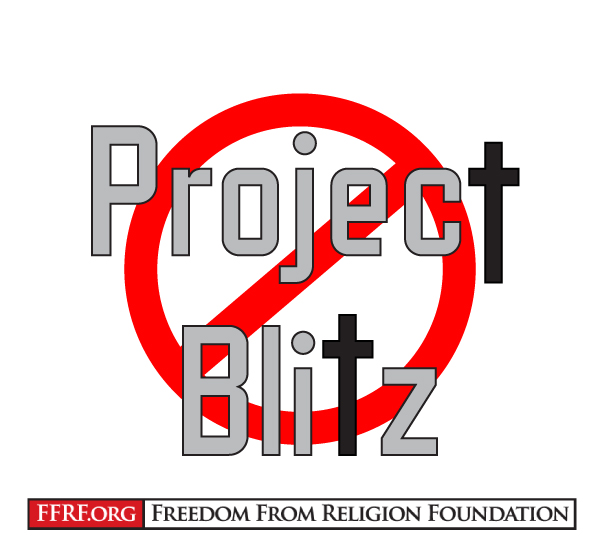
A major stealth campaign to legally enshrine Christianity in states all over the country is being forced into the public eye, thanks to dozens of leading constitutionally minded groups, such as the Freedom From Religion Foundation.
“Project Blitz” is a coordinated national effort by the Congressional Prayer Caucus Foundation and others to incorporate Christian nationalism in state laws across the country. It promotes a three-tiered framework of state bills intended to incrementally redefine religious freedom to tear down the separation of church and state, with each tier laying the groundwork for the next.
Religious freedom is a fundamental American value, FFRF and the 42 other organizations, which range from American Atheists to Muslim Advocates, maintain in a joint statement spotlighting Project Blitz.
“The separation of church and state … is the linchpin of religious freedom and a hallmark of our democracy,” the statement asserts. “It ensures that each person has the right to choose whether to practice a religion or be nonreligious without pressure from the government.”
But Project Blitz is out to breach the wall of separation.
“An alarming effort is underway to harness the power of the government to impose its faith onto everyone else, including our public school students,” the statement contends. “This effort seeks to transform religious freedom into a sword that can be used to harm others, undermining important civil rights protections and health care access, especially for women, LGBTQ people, those of minority faiths, and the nonreligious.”
Therefore, FFRF and other secular organizations urge legislators across the nation to oppose Project Blitz and similar efforts. America is stronger when the government gives no set of religions or beliefs more power or preference than any other — and when everyone is welcome and treated equally under the law.
The Freedom From Religion Foundation is proud to be part of this combined initiative, organized by Americans United for Separation of Church and State, to preserve our secular values and ensure that the nefarious “Project Blitz” project to undermine our Constitution doesn’t succeed. A list of the 43 signatories is available at the end of the statement.
Freethought Radio -- January 31, 2019
Bladensburg cross dishonors freethinking veterans, secular groups contend to Supreme Court
 A huge Christian cross on public land in Maryland is massively disrespectful to nonreligious Americans, the Freedom From Religion Foundation and four other secular groups are contending before the U.S. Supreme Court.
A huge Christian cross on public land in Maryland is massively disrespectful to nonreligious Americans, the Freedom From Religion Foundation and four other secular groups are contending before the U.S. Supreme Court.
The friend of the court brief in support of the American Humanist Association’s case before the Supreme Court was filed yesterday by FFRF, the Center for Inquiry, American Atheists, Military Association of Atheists & Freethinkers, and the Secular Coalition for America.
The Supreme Court will be holding oral arguments on Feb. 27 in the challenge of a major 4th U.S. Circuit Court of Appeals victory that the American Humanist Association obtained in October 2017. The appeals court affirmed that a mega-cross, which was erected as a war memorial in Bladensburg, Md., is unconstitutional. It held that the 40-foot-tall cross “excessively entangles the government in religion” because the cross is the “core symbol of Christianity” and “breaches” the constitutional wall dividing state and church. The petitioners challenging this ruling are the Maryland National Capital Park and Planning Commission and the American Legion.
The Supreme Court needs to keep in mind the rights and sensibilities of the large disbelieving portion of the U.S. population while making its decision, the secular groups urge in their joint amicus brief. As secular and humanist organizations that promote freedom of conscience for those who do not practice religion, the groups’ brief offers a unique viewpoint on government display of religious symbols and the exclusion of religious minorities and nonbelievers.
Today, between one-fourth and one-third of Americans identify as religiously unaffiliated. The government’s use of prominent religious symbols serves to stigmatize, marginalize and diminish that large portion of citizens who exercise their constitutional right not to believe or practice a religion. These same trends are present in the U.S. military. In 2017, more than 30 percent of the active duty population of the American military did not affiliate with any religion. The five secular groups note that those soldiers risk their lives to defend our country. So, when we purport to honor them, why would we do so in a manner that disrespects their nonbelief?
“The ‘First Amendment mandates governmental neutrality between religion and religion, and between religion and nonreligion,’” to quote the U.S. Supreme Court, the brief observes.
“When the government selects a single religion’s symbol to honor and remember war heroes of many religions and no religion, the practice not only endorses and advances the preferred religion. It also stigmatizes, marginalizes and diminishes those citizens who exercise their constitutional right not to believe or practice the endorsed religion or any religion.”
The brief asks the court to imagine if the shoe were on the other foot: A Christian who takes for granted being surrounded by Latin crosses and other Christian symbols might well think twice about seeing an Islamic crescent or Wiccan pentangle or Atheist atom on a prominent government building, display or monument, especially one purporting to honor the sacrifice of those with different religious views. A religious minority or nonbeliever feels the same way when the symbol is a large and prominent Latin cross. And that feeling of exclusion is even more salient for those who, unlike Christians, are part of a religious minority already confronting stigma, disfavor and discrimination in many aspects of public life. For instance, almost half of all Americans “would be unhappy if a family member were to marry someone who doesn’t believe in God,” according to the Pew Research Center.
When deciding whether the Establishment Clause permits the government to use the Latin cross to collectively honor fallen soldiers, the historical practices of the U.S. military reveal that the military has scrupulously avoided using sectarian symbols, such as Latin crosses, to mark the graves of soldiers who practice a different religion. Nobody would argue that the government could decide to use a Latin cross to mark the headstone of each and every veteran buried at Arlington. In Bladensburg, purporting to memorialize all soldiers through a symbol of only some soldiers’ religion has the same effect. “The military’s history and practice reflect that the reasonable outside observer would treat a government display of a prominent Latin cross, purporting to collectively memorializing war heroes, as an endorsement of Christianity and as stigmatizing and marginalizing non-Christians,” the secular groups contend. “This understanding requires no logical leap: a Latin cross is unmistakably ‘the preeminent symbol of Christianity,’” to quote the U.S. Supreme Court.
The U.S. solicitor general and others are asking the Supreme Court to disregard the harm to nonbelievers from the government’s use and promotion of Christian symbols, arguing that there cannot be an Establishment Clause violation without a showing of coercion. Establishment Clause principles have long prevented government from stigmatizing nonbelievers. And those principles are particularly salient today, because tens of millions of Americans — and counting — identify with no religion.
In yoking patriotism and sacrifice to Christianity — and Christianity alone — the Bladensburg memorial inflicts injury on millions of vulnerable Americans who are not affiliated with any religion — including American soldiers risking their lives to defend their country. That’s why FFRF and four other like-minded organizations are urging the U.S. Supreme Court to uphold the ruling of the 4th U.S. Court of Appeals. A judgment to the contrary would dishonor the innumerable soldiers without belief who have fought and died for our nation.
The Freedom From Religion Foundation has two main purposes: to educate about nontheism and to preserve the cherished constitutional principle of separation between religion and government. It currently has 31,900 U.S. members. The Center for Inquiry is a nonprofit organization devoted to promoting reason, science, critical thinking and humanist values. American Atheists is a national civil rights organization that works to achieve religious equality for all Americans by protecting what Thomas Jefferson called the “wall of separation” between government and religion created by the First Amendment. The Military Association of Atheists & Freethinkers builds community for atheists and humanists in the military. The Secular Coalition for America is a national nonprofit advocacy organization dedicated to amplifying the diverse and growing voice of the nontheistic community in the United States.
The Freedom From Religion Foundation thanks the law firms of Orrick, Herrington & Sutcliffe and Clinton & Peed for crafting the brief.

The Catholic Church’s clout in the Chicago area has resulted in the Windy City’s two daily newspapers rejecting a Freedom From Religion Foundation media campaign that spotlights a survivor of priest abuse. The ad urges: “Stop ignoring headlines: It’s time to leave the Catholic Church.”
Chicago’s alternative weekly, the Chicago Reader, has demonstrated more bravery than its daily peers, and is today, Jan. 31, publishing a version of the full-page ad in this week’s edition.
A Chicago-area member who was sexually abused at age 13 by his parish priest suggested and underwrote the FFRF ad and is using a portion of his church settlement to pay for the plea to the public to abandon the Catholic Church. The person asked that the ad be timed to run during National Catholic Schools Week (Jan. 27-Feb. 2).
After encountering print censorship, FFRF is fighting back by placing prominent billboards all over Chicago, including a 20-by-60-foot sign on the Kennedy Expressway west of Montrose stating, “Value Children over Dogma: It’s Time to Leave the Catholic Church.” The powerful image depicts a small schoolgirl hiding her face. That message will go up in February for the entire month.
Additionally, starting today, Jan. 31, 11 digital billboards throughout the Chicago area will be flashing the message: “It’s Time to Leave the Church.” Those signs will stay up through Feb. 10. Click to view billboard locations. See map below.
The ad in the Chicago Reader lists a series of real newspaper headlines about the ongoing revelations of massive priestly abuse of children and the subsequent Church cover-up, urging readers to stop supporting the world’s largest and most powerful religious institution.
The suppression of FFRF’s ad by Chicago’s two dailies shows the power of the Catholic Church to intimidate its critics, maintains Annie Laurie Gaylor, FFRF co-president.
“The ‘look the other way’ deference the Church has continually demanded and received — from congregations, media, police and courts — is the very reason why so many horrific crimes against children have occurred and gone unreported and unprosecuted in the first place,” Gaylor says. “The Catholic Church remains a virtuoso in silencing not only its critics, but its hundreds of thousands of victims — including one Chicago-area victim seeking to spare future children similar abuse.”
Adds Tom Cara, volunteer director of FFRF Metropolitan Chicago Chapter, which helped oversee the ad campaign: “It is tragic when a major metropolitan’s two largest newspapers elect not to publish a public condemnation of an organization’s horrific crimes. Our ad is a plea for help from a victim, and it is being ignored in order to protect the offenders.”
The Freedom From Religion Foundation is a national freethought association dedicated to keeping state and church separate, with almost 32,000 members and several chapters all over the country, including nearly 1,000 members and its Metropolitan Chicago chapter in Illinois.
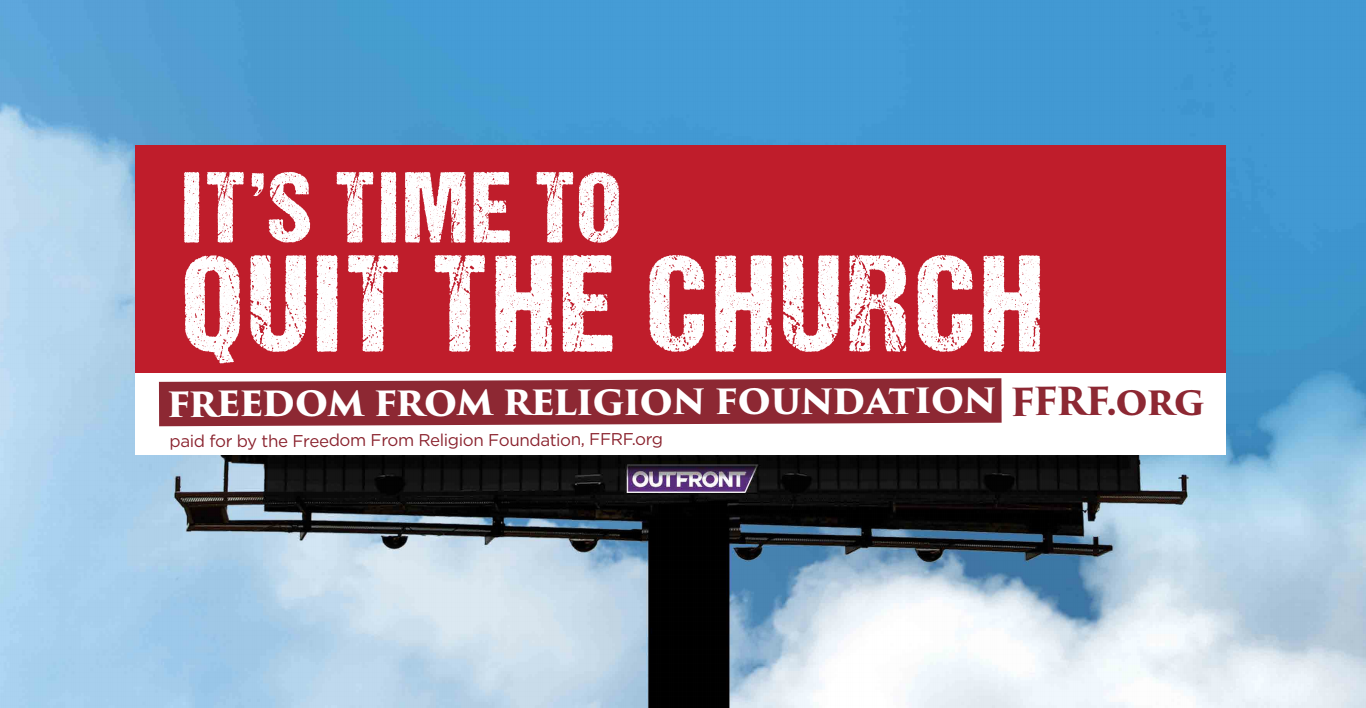
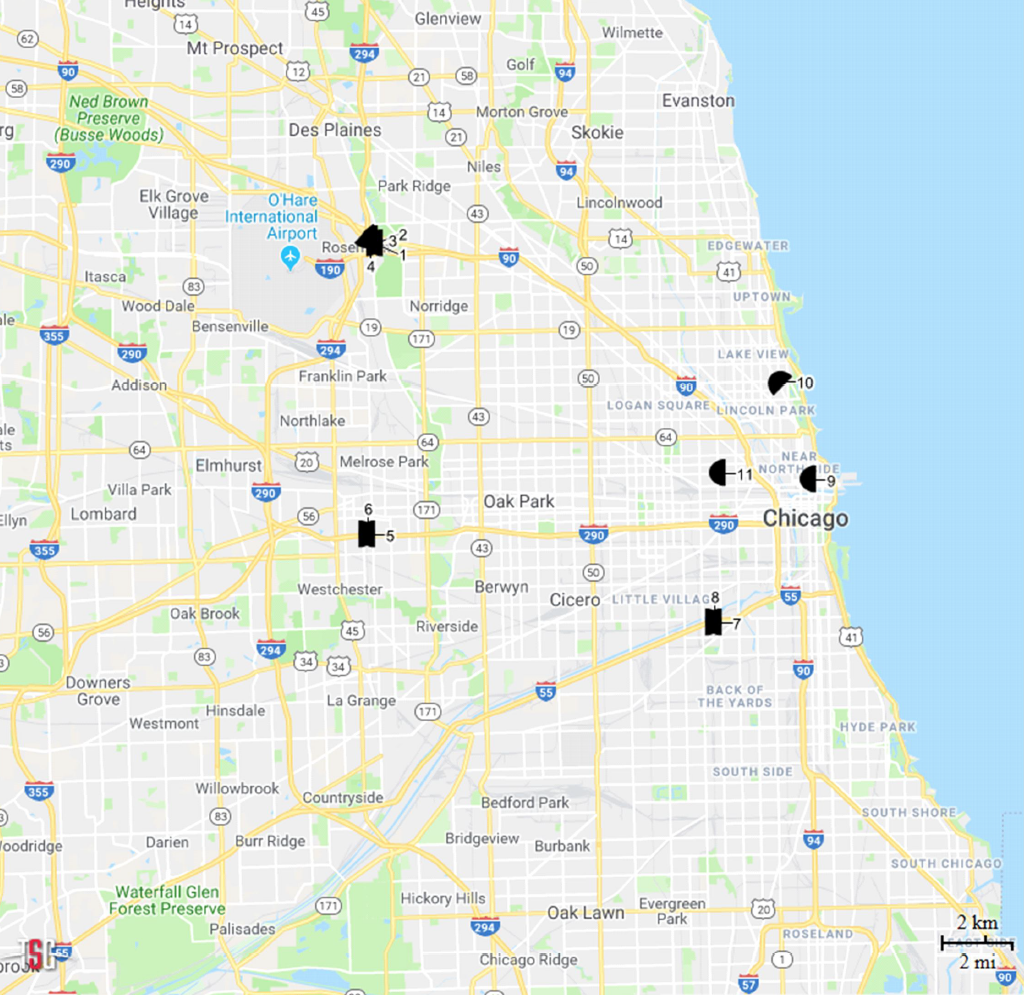
FFRF chides Wis. governor for beginning term on sectarian note

The new governor in Freedom From Religion Foundation’s home state has started his tenure with a major state/church misstep, causing FFRF to formally complain.
On Jan. 7, Wisconsin Gov. Tony Evers’ Inaugural — the first state-sponsored event with him at the helm — included religious (almost completely Christian) content that led local FFRF members who were in attendance to feel immediately excluded. For example, the ceremony opened with an invocation by the Rev. Willie Brisco that plainly conveyed a Christian message:
May we all bow our heads. God our father, we thank you for your grace and mercy toward us. . . . God, I ask that you invoke [sic] your richest blessings on him and his administration as he assumes the mantle of leadership of this state. . . . Give us the strength to stand with our leaders, the courage to encourage them, and continue to pray for them because we know that this journey is not easy. And we must, with those who wait on the Lord, shall renew their strength, they shall mount up with wings like eagles, they run and not be weary, they shall walk and not faint.
The occasion also included a concert of Christian songs by William Reed III Community Choir, a gospel choir, featuring repetitive theological lyrics about worshiping Jesus, such as:
Oh, happy day
When Jesus washed, he washed my sins away!
he taught me how to watch, fight, and pray
and he'll rejoice in things we say everyday
Two more religious songs, including “He's Our Hope,” about Jesus, were performed, also repeating religious lines over and over. After the Christian invocation and Christian gospel choir, even the ordinarily banal inclusion of “God bless” by various speakers contributed to an overall impression that the event was intended mainly as a celebration for Wisconsin Christians.
“A gubernatorial inauguration should not be constructed like a worship service,” FFRF Co-Presidents Dan Barker and Annie Laurie Gaylor write to the governor. “It is a civic ceremony inaugurating the governor’s installation in a secular seat of government. If religious components are desired, there is nothing to stop a governor from holding a private religious ceremony separate from the inauguration at their preferred religious institution.”
The religious overdose sent a clear message to nonreligious Wisconsinites that we were not a part of the event, Barker and Gaylor state. This is particularly distressing and frustrating, given that 24 percent of Americans today are nonreligious. Further, more than half the residents of Dane County — the seat of which is Madison — are nonreligious.
As governor, Evers took an oath of office to uphold the U.S. Constitution, which is a godless and secular document in which the only references to religion in government are exclusionary, such as the prohibition on religious tests for public office, FFRF reminds Wisconsin’s new chief executive. The federal and state constitutions dictate that the gubernatorial office may not insert religious rituals into government-sponsored events, including inaugurations.
FFRF is urging the governor’s office in the future to honor our secular form of government and keep divisive and unnecessary religion out of state-sponsored events.
The Freedom From Religion Foundation is a Madison-based national nonprofit with 31,000 members, including more than 1,700 in Wisconsin. FFRF's purposes are to uphold the constitutional separation between church and state, and to educate the public on matters related to nontheism.
Freethought Radio -- January 24, 2019
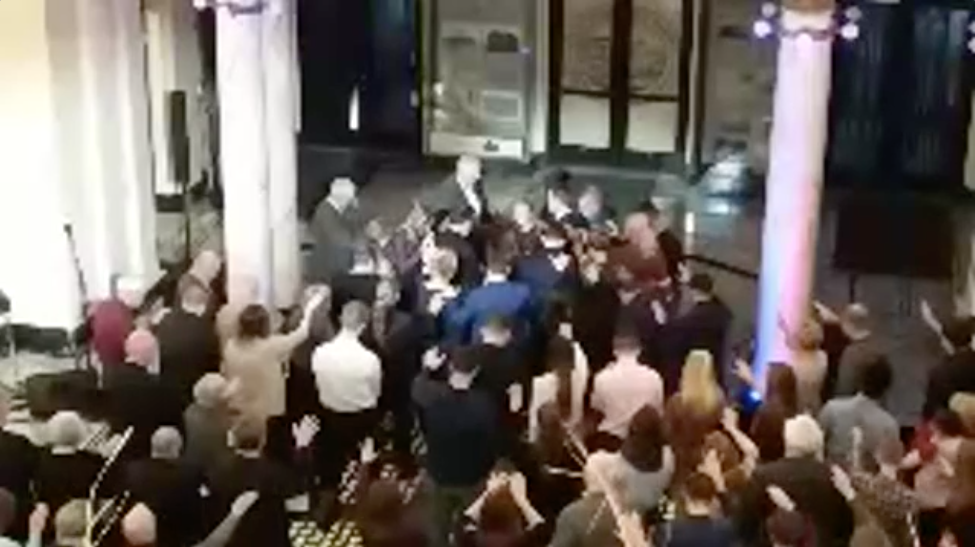
An over-the-top, government-sponsored religious service in the South Dakota Capitol is making the Freedom From Religion Foundation react in disbelief.
On Jan. 6 — her first full day as governor of South Dakota — Gov. Kristi Noem sponsored a church service in the Capitol rotunda. The event was billed as an “Inaugural Worship Service with Governor Noem,” explicitly tying this religious event to her inauguration and public office. Despite assurances that “all [were] welcome,” this event made no attempt at being an “interfaith” service; every aspect was decidedly Christian in nature.
The service featured Christian music, a full sermon by a pastor, and multiple group prayers. One of these prayers, led by a woman who identified herself as the new governor’s family friend, endorsed a Christian nationalist vision for South Dakota, saying of God: “You are the Lord and King of South Dakota” and “We thank you, Lord God, that we have faith — faith in You. And that Holy Spirit is filling this place now as we worship you, and the Holy Spirit absolutely takes over every corner and every crevice of this Capitol and of this state.” The woman then pivoted from Christian nationalism to exorcism, praying that “any demon that may try to come in this place is kicked out.”
As governor, Noem represent a diverse population that consists of not only Christians, but also atheists, agnostics, Jews, Muslims, Hindus, Wiccans — in short, people of all beliefs and backgrounds, FFRF stresses. This worship service summarily excluded the nearly 30 percent of U.S. adults and the over one-in-five South Dakotans who are not Christian. The nonreligious are the fastest-growing segment of the U.S. population by religious identification, now making up 24 percent of Americans, and 38 percent of younger Americans.
“We hope that you can see how your endorsement of an event at which attendees were asked to pray that ‘the Holy Spirit absolutely takes over every corner and every crevice of this Capitol and this state’ sent an unmistakable message to all nonreligious South Dakotans ‘that they are outsiders, not full members of the political community,’” FFRF Legal Fellow Colin McNamara writes to the governor, quoting the U.S. Supreme Court. “We urge you to focus on the secular business of governing, and leave church services where they belong — in a church.”
At her inauguration, Noem took an oath of office to uphold the U.S. Constitution, a secular document in which the only references to religion in government are exclusionary, such as the prohibition on religious tests for public office, FFRF reminds Noem. The use of her official position to promote her personal religion directly contravenes this oath. The Supreme Court and lower federal courts have said time and again that the First Amendment “mandates governmental neutrality between religion and religion, and between religion and nonreligion.”
“Noem is off to a bad start as the steward of the state of South Dakota,” says FFRF Co-President Annie Laurie Gaylor. “She needs to now reassure South Dakotans that her administration will not be sectarian Christian in nature, and that she understands that she has been elected to a secular post, not as a preacher-in-chief.”
The Freedom From Religion Foundation is a national nonprofit organization with 31,000 members across the country, including in South Dakota. Its purposes are to protect the constitutional separation between state and church, and to educate the public about matters relating to nontheism.



